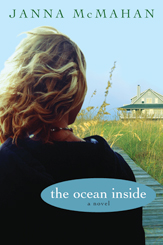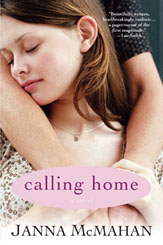At 28, I was working fulltime as the PR director for an art museum and completing my thesis when I was diagnosed with breast cancer. A scare like that has a way of focusing your priorities.
Janna McMahan is the national bestselling author of the novels Anonymity, Calling Home and The Ocean Inside. She has won numerous literary awards for her short fiction including being named a finalist for the 2010 Flannery O’Connor Awards. Follow her on Twitter @JannaMc or on Facebook at Janna McMahan Fan Page. Watch the book trailer of her new novel at www.JannaMcMahan.com.
Novel: Anonymity
Novel: Calling Home
Novel: The Ocean Inside
How Janna McMahan Became a Writer
This is the next installment in the How to Become a Writer interview series, which will post here at Ph.D. in Creative Writing every other Sunday (or so) until I run out of writers to interview, or until they stop saying yes. Each writer answers the same 5 questions. Thanks to Janna for saying yes!
1. Why did you want to become a writer?
I grew up in a very small town in Central Kentucky and I always had a keen curiosity about the rest of the world. I desperately wanted to travel and reading was the only way I could visit other places. I quickly grew bored with the children’s books in our school library, so I was overjoyed when we finally got a community library. I was there to volunteer the day the doors opened. I was only eleven when I started reading adult literature. As I returned books to the shelves, I would fantasize about having my name on the spine of a novel. I have friends who say they still have short stories I wrote in grammar school. I don’t remember a time in my life when I wasn’t writing. It just seems innate to my nature.
 2. How did you go about becoming a writer?
2. How did you go about becoming a writer?
At 28, I was working fulltime as the PR director for an art museum and completing my thesis when I was diagnosed with breast cancer. A scare like that has a way of focusing your priorities. Once I was emotionally stable enough to look to the future again, I decided to work on that novel I had always wanted to write.
I am a type-A personality, always juggling multiple projects, which I’m sure contributed to my diagnosis. I decided to lower my stress level and concentrate only on writing. My husband was super supportive of my dream, so I finished grad school, quit my job and started to write. I attended a number of writing conferences. I took a fiction class at a community college and formed a serious writing group with some of my fellow students. Everyone brought a chapter each week and within a year, I had a respectable manuscript.
Then reality set in. How did one find representation and a publisher? I won a number of short fiction awards during that time, so it seemed I had the creative ability, but those short, pleasant rejection letters kept coming from agents. Even though I’m generally a tenacious sort, I became frustrated with the process. Thank goodness for author friends who insisted I stick with it. Like many people, I think I wanted the romanticized life of being a writer without slogging through the work it takes.
 3. Who helped you along the way, and how?
3. Who helped you along the way, and how?
I met Silas House on his first stop for his first novel. He encouraged me to come to the Appalachian Writers Workshop where he had found the support he needed to write and sell Clay’s Quilt. I’d been to a few of the larger writing conferences so I was dubious that such a small workshop would be beneficial, but when I walked into that settlement school in the mountains of Eastern Kentucky I suddenly felt at home. It was a supportive atmosphere and the instructors sincerely wanted to help the students become good, successfully published writers. I went for seven years and I formed relationships with Lee Smith, Robert Morgan, Ron Rash and a number of other writers from the region. Over the years these lovely people have recommended agents, provided introductions to editors, wrote quotes for my books and lent general emotional support.
This can be a brutal industry. If it were not for the kindness and encouragement of established writers, I think I would have given up. I now feel an obligation to lend a hand to talented people I meet, but far too often eager writers ask for help before they are ready. My advice to aspiring writers is to finish that manuscript, rewrite until it is perfection, then workshop it at a conference with authors you respect. Never approach an author and ask them to read your manuscript unsolicited. It isn’t that we don’t want to be helpful, but truthfully, for legal reasons we can’t read a manuscript unless it is under contract or done through a workshop setting.
4. Can you tell me about a writer or artist whose biography inspires you?
Ron Rash is someone I’ve always admired. Ron is a good soul. My impression is that he writes without regard to what may or may not be commercially successful. It took him a long time to become the hot writer he is now. I remember his first novel winning the Novello Literary Award, which broke him out on a national level. He is a poet first, so his language is lyrical and his stories reveal themselves like flowers opening. I admire Ron most for his level-headed approach to success. His books are now reviewed by the New York Times and his novel Serena is soon to be a major motion picture, but Ron is still the same affable, calm, lovely person. He doesn’t appear caught up in the hype. Ron just writes because he loves to write.

5. What would you say in a short letter to an aspiring writer?
You are not as good as you think you are. Period. Talent is important, without it you’ll go nowhere, but talent is not enough. You have to study and write and read and write and go to conferences and write. Read books on writing. Join a writing group. Be open to criticism. Criticism is very important to the creative process. You don’t have to act on all criticism, but be open and really hear what others have to say. Study authors you admire and try to figure why their stories work. The most important thing is rewrite, rewrite, rewrite. A first draft should be followed by two dozen more drafts. Be hard on yourself. There is always room for improvement. Always.










